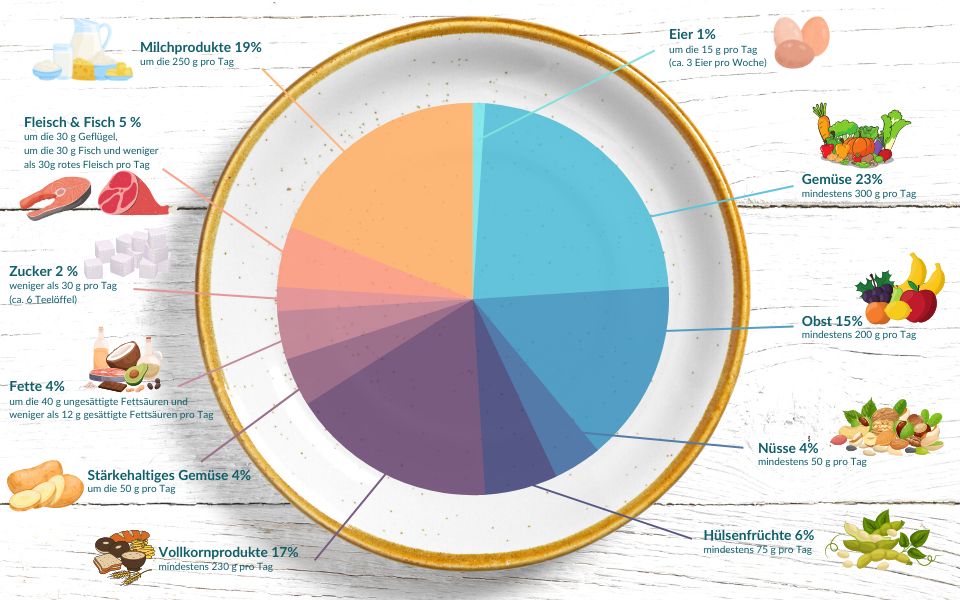Live longer, healthier and more climate-friendly with the "planetary diet"

Four years ago, the EAT-Lancet Commission, a group of 37 researchers from 16 countries, presented the so-called "Planetary Health Diet". In principle, we reject any form of diet, but we still want to write about this one because it has nothing in common with the conventional understanding of diets. Its aim is to save humanity and the planet. It is common sense and protects both your own body and the planet at the same time. A real win-win situation, in our opinion.
"The food we eat and the way we produce it determines the health of people and the planet, but we are currently getting this seriously wrong."
Tim Lang, Professor at the University of London and co-author of the study
What you want to achieve
The goals of the Planetary Health Diet are ambitious. On the one hand, the aim is to feed the world's growing population of 10 billion people in a healthy way by 2050 and, on the other, to establish sustainable food production in order to minimize the impact on the environment and climate.
This has positive side effects:
- the use of our soils for various arable crops instead of cultivation for the animal feed industry
- greater species richness
- an improvement in the soil
- the reduction of our ecological footprint, because compared to animal-based food, water and land requirements as well as nutrient pollution and greenhouse gas emissions are reduced.
Protects against illness
In addition, experts at Harvard University have found that this diet reduces the mortality rate by a quarter, i.e. 25%, because a plant-based diet reduces many health risks, including strokes, colon cancer and diabetes. The risk of suffering from respiratory diseases is also 50 percent lower with sustainable eating habits. The same applies to heart disease, cancer and neurodegenerative diseases - the risk of developing these was significantly lower with a sustainable diet. In addition, deaths from infectious diseases were only half as common in women.
What does the Planetary Health Diet involve?
The Planetary Health Diet is a flexible nutrition plan based on a daily energy intake of 2500 kcal. According to the EAT Commission, the actual diet must be adapted to the local cultural, geographical and demographic conditions as well as the individual needs of each person.
The simplistic rule of thumb is: double your fruit and vegetable intake and halve your meat consumption.

The Planetary Diet is based on plant-based foods:
- Vegetables (23%),
- Legumes (6%),
- Fruit (15%),
- Whole grain cereals (17%),
- Nuts and
- high-quality vegetable oils.
Only a small proportion of
- Meat (2.5%),
- Fish (2.5%),
- Dairy products (19%) and
- Eggs are allowed.
Example: A typical Planetary Health Diet meal plan could consist of a porridge and fruit bowl for breakfast, a vegan chickpea and couscous salad for lunch and vegan spaghetti bolognese for dinner.
This is because animal-based foods require significantly more limited resources such as water, energy and land and contribute significantly to climate change due to higherCO2 emissions.
No Go Food
Foods such as sugar and white flour products should be removed from the diet for health reasons, as should red meat, the production of which is particularly harmful to the climate.
Setting environmental limits with the Planetary Health Diet
In order to limit the environmentally damaging effects of our food production, the EAT Commission has also defined global environmental limits that the Planetary Diet should comply with.
- Reduction of greenhouse gas emissions
- Limiting global land consumption
- Limiting freshwater consumption
- Reduction of nitrogen fertilization
- The same applies to phosphate fertilization
- Stopping the extinction of species
"We need a comprehensive overhaul that will change the global food system on an unprecedented scale."
Tim Lang, Professor at the University of London and co-author of the study
To achieve these goals, the Commission proposes the following strategic plan:
- International commitments to a transformation towards healthy nutrition
- Reorientation of agricultural production, away from mass production towards healthy food
- Sustainable intensification of food production
- No expansion of agricultural land, no overexploitation of the oceans through international monitoring
- 50 percent reduction in food waste
The researchers' conclusion
It will be impossible to feed everyone in a healthy and sustainable way if eating habits do not change, food production is not improved and food waste is not reduced.
We want to see animal products for what they are: A highly valuable commodity
Our pro.earth conclusion
The Planetary Health Diet, with its coupled approach of promoting human health while improving agricultural production towards sustainability and curbing food waste, is a wonderful way to change the prevailing food industry for the better on a global level and can be easily implemented on an individual level. Each of us can take these simple guidelines to heart and reduce our own meat consumption in favor of vegetables and legumes. Ideally with seasonal and regionally produced foods. Simple. Do. Now. #actinsteadofspeaking






